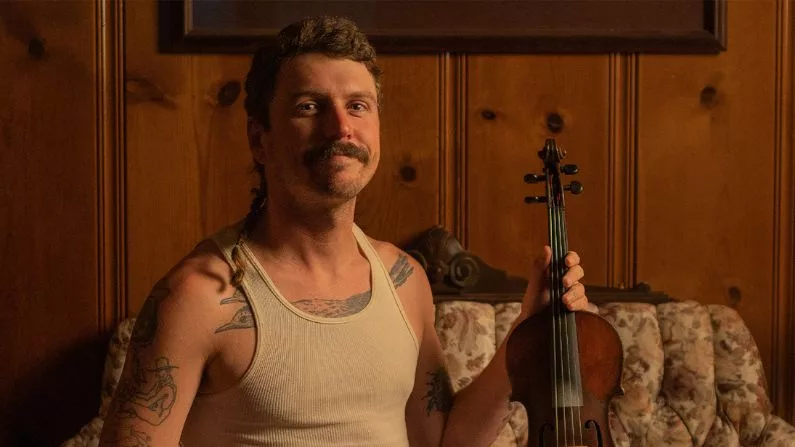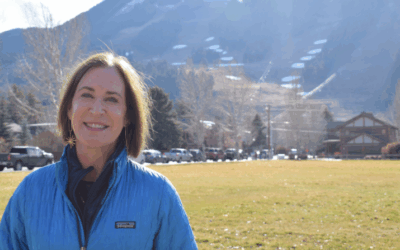Nick Shoulders is a singer-songwriter, yodeler and multi-instrumentalist from Fayetteville, Ark. Shoulders and his “Okay Crawdad” band have a sound that’s hard to pin down.
Shoulders and his band combine his family’s deep ties to southern traditional music with years busking on street corners to create a raucous melting pot of country, folk and blues that Shoulders likes to refer to as “grandpa music.”
The band’s new album, “All Bad,” features dance-ready rhythms and heavenly melodies that juxtapose with the album’s thought-provoking lyrical themes.
In advance of his show on Saturday, Sept. 2 at the Mangy Moose, bandleader Nick Shoulders joined us recently over the phone in the KHOL studios.
The following interview transcript has been edited for clarity and brevity. This conversation was recorded on Monday, August 28.
JACK CATLIN/KHOL: Your music has a consistent theme of familial lineage. Can you touch on keeping that family tradition alive and how important that is to you?
NICK SHOULDERS: My grandma used to say something to the effect of, ‘You know, people used to whistle.’ And I think what she was saying is when it was a function of our day-to-day lives and not necessarily a product or an industry that we interact with around music, that people were better at it. Generally, people enjoyed and loved music so much more back then. And I think that’s what people see in country and folk music and get attached to is that line back to a time when this music was sort of functional and not surrounded by an industry. And I think that in that sense, what we’re trying to accomplish isn’t necessarily some kind of nostalgia trip or to brag on like, ‘Oh, we’ve got the best singing grandparents’ because it’s not true. We’re all, in a way, divorced from the traditions that truly enshrine and enrich people’s lives before country music as an industry existed.
The first recordings that we can call country music are not much more than 100 years old, if that barely. We’re not trying to aggrandize our own familial lineage so much as inspire everybody to tap into their own, because we’re all a part of that and all have a section to contribute to that. I think that’s kind of the big journey within it. Country music is this that we have now, but if you just follow the threads back the way that people play the instruments and sing, you can find a time pretty quickly when those ways of interacting with the music weren’t on record. They were in communal spaces and with people. And in that sense, I think it’s empowering for everybody because we really all have access to that in a way.
KHOL: When did you first notice that yodeling and whistling could really work with the music you were making?
SHOULDERS: I didn’t really receive any sort of honest, critical feedback about the styles of music I was into and producing until I left Arkansas and got out of the South significantly. And when I was playing on street corners and in little clubs out west on my travels, I was living in my van. I noticed people were really reacting to that stuff and were really drawn to it in a way that I had always been, frankly slightly embarrassed about it. I thought it was pretty novel or even hokey to draw from this stuff and quickly realized that people really saw themselves in it and then started to realize that yodeling and whistling were not sort of endemic and peculiar to American southern country music. You can hear yodeling in West Africa, and you can hear it in Hawaiian traditional music. You can hear it in the Southwest. That style of break-note singing is something pretty universal to the way people made music. And it speaks to folks in every corner.
I think that that’s another one of those tapping into the greater lineage type things that I think that we get to do something so cool to sing all the time. And it just so happens that my way of singing is kind of archaic and based on skill sets that were rooted in the land. And I think that that has a specific sort of light that it turns on for people. When I started noticing that, I really reacted to it and was like, ‘Well, if that’s what I’m good at, I should lean into it and do it.’ So the short answer is noticing that it wasn’t just noble and hokey, that people seem to like it.
KHOL: You have a complex relationship with modern country music. You’ve been outspoken about it. And I really like this quote from your country music art page on your website. One poster in the series reads ‘These are divided times and this genre now belongs to us all. But lest we forget, country music is a product of inequality and doesn’t exist to glorify the powerful.’ Can you expand on that for us?
SHOULDERS: I think if you took the country music recordings of 1929, the sort of formative years and what you get in 1969, you see two very different bodies of work. The world of the early country stars was one of never ending wars and bank failures and depression and dust bowls. And that’s really reflected in the reality that you see in the songs. You know, you’ve got your “Single Girl, Married Girl” being one of the early hits of country music. It’s like an express critique of patriarchy, and it was very much a way of interacting with the powerful that is speaking truth to power. And then you fast forward to “Fight Inside Of Me” by Merle Haggard, and you’ve got something that is very much reinforcing power and saying, ‘No, we won’t ask any hard questions, we won’t question authority. You don’t love it, leave it.’
And those are two very different types of country music. And I think that notion of potential music being a product of a geographic experience, I think is easy to punch holes in. Saying it’s just from the South doesn’t necessarily really add up because it’s not completely true in a really staunch pure sense. What I think is more instructive to say is, ‘Okay, so if there’s syncopation and certain vocal styles and chord structures within country music that are obviously coming from African-American influences, and we’re also seeing Native American influences, Hawaiian influences, and it’s coming together in a specific place that is functionally plural, but legally segregated being the American South, then we can say, okay, this may not have a geographic origin, but it’s an expression of distaste with power. It’s a reaction to systems of oppression, to inequality.’
And because it’s common people music, there has to be aristocrats for there to be common people. And so for there to be the contrast, there really needs to be an assessment of how harsh that inequality is between the planter aristocracy and everybody else in the South specifically. And I think that that’s where you get into something more unifying is you can be like, ‘Well, country music is founded in rebellion rather than it’s founded in the South or it’s founded in the West.’ Because, I mean, when you say country and western, you’re talking about western soundtracks like the western in country and western was about theatrical roles in Hollywood movies. For me and for people who are really trying to ask honest questions of country music and about power, it’s not a theatrical role. It’s something really painful and deep and something that we hold on to dearly. The notion of reclaiming country music as something more than rural music and rooting it to family and rooting it to the experience in the South and how drastic that inequality is, I think that’s kind of our whole work here, you know?
KHOL: The title track of your new album “All Bad” seems to be almost a manifesto of what you’re trying to convey in your music with the lyrics dealing with things like societal failures, ecological destruction and extreme corruption. Can you break that song down for us in particular?
SHOULDERS: I feel like I got to write a general woodland, mid-south, weirdo, upland, freaky song with snakes and waterfalls in terms of speaking to a general experience. But “All Bad” was sort of my attempt to progress that in the sense of just being a straight up autobiography. I was going straight from the front to back of my experience within this life of mine. And yeah, I think highlighting some specific events, just being able to be honest about the fact that there’s nothing glorious or outlaw about going to jail at 19 and then being on probation for three years and missing. I didn’t get to drink on my 21st birthday. There is nothing particularly glorious or did it help my career to have multiple lung surgeries and years of recovering from that at the same period. But it did build a patience and a resilience that I think is where I really, truly want to pass something on.
It’s easy to pass on anger and to pass on frustration and grievance is easy to say, but in my own mind, the true resistance is in having some manner of joy, like not letting the thing wear you down to the point that you can’t function and can’t be joyful. And so that’s something that I think is maybe missing from a lot of the harsh critiques that I myself have offered amongst others, is that, yeah, you can find rebellion in simply refusing to be worked to death. That’s where I hope that songs like “All Bad” can be a simple little demonstration and push to embrace that notion of joy as an act of resistance.
Listen above for KHOL’s full conversation with Nick Shoulders.






